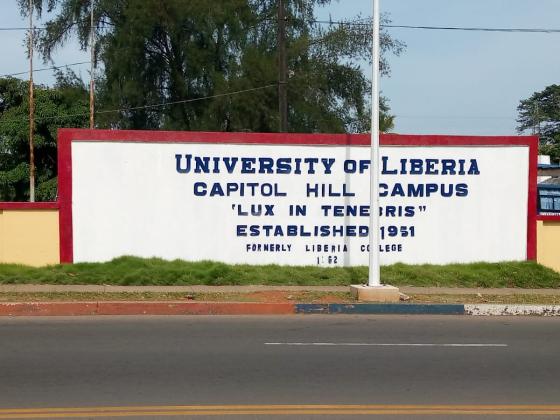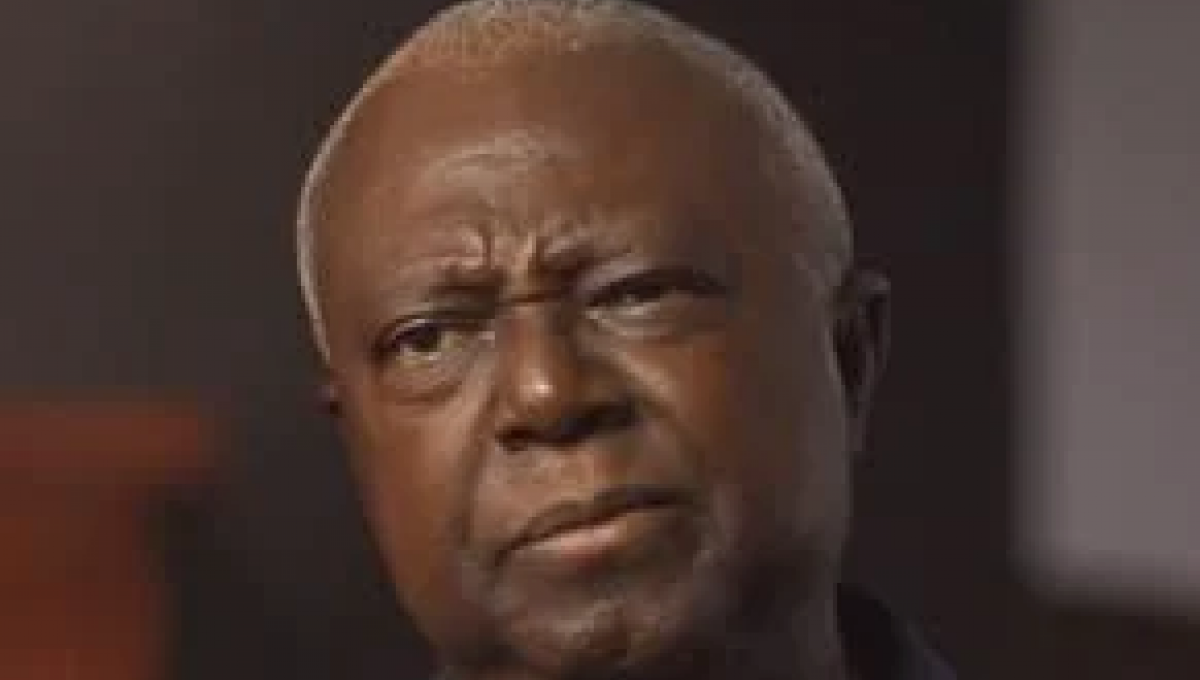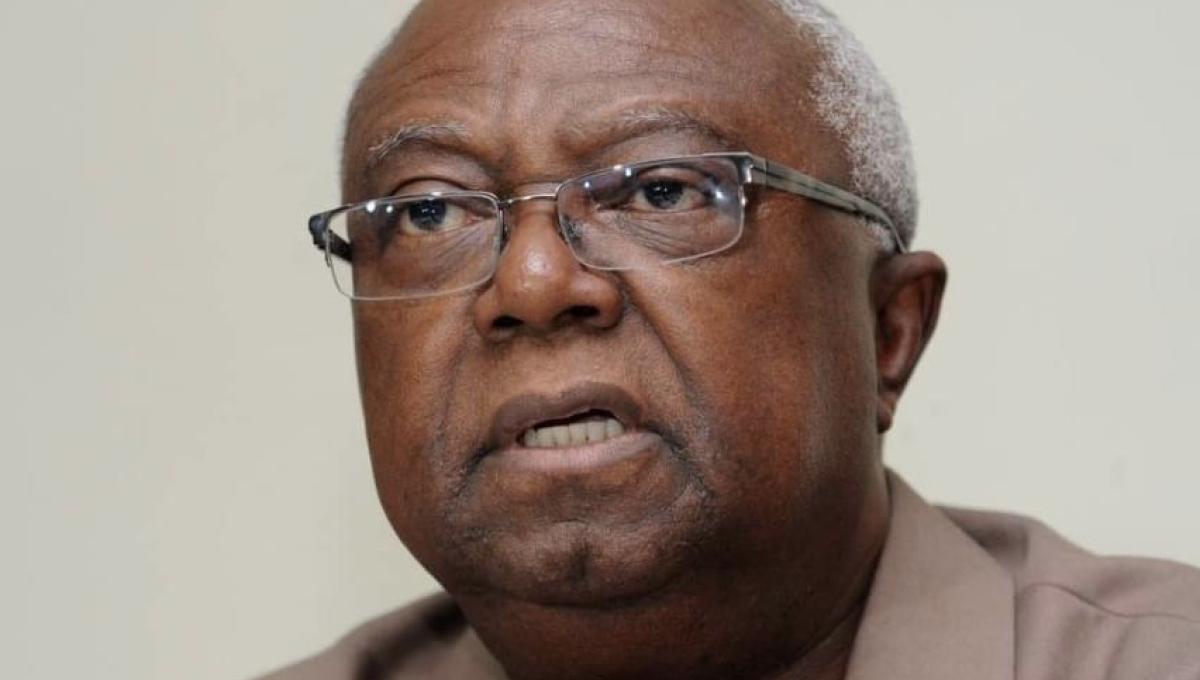University of Liberia to Uphold Dr. Sawyer’s Legacy

Dr. Wonkeryor: We will begin the evaluation of faculty credentials at the University of Liberia and subsequently, Tubman University.
The University of Liberia (UL), one of the main institutions where Dr. Amos Claudius Sawyer proficiently and effectively shared his academic and intellectual gifting, has assured his family and the public that his legacy will live on, regardless of change of leadership or challenges at hand.
“Thus, even though today is a mournful day, it's also a joyous day because we have come to celebrate the life of a man who has played his part on the stage of life to the fullest. He played his part so very well that he impacted the lives of many of us. He showed the light for others to see and follow,” said Dr. Julius Sarwolo Nelson, President of UL.
The UL President added the University will hold consultations with the deceased former professor’s family to consider building a structure in which particular disciplines on governance and democracy will be taught in memory of the ideals Dr. Sawyer bore, cherished and taught all through his earthly life.
“Dr. Sawyer was a man of a strong and enviable intellect, a balanced temperament, compassion, and humility in service to humanity. His patriotism and love for the Republic of Liberia were unquestionable. He was a precious gem of Liberian society,” Dr. Nelson noted. “He served in his capacities as professor and dean very well. He left traceable prints. He joined the University and satisfied the desired results in public policy in the democratization of our country. Dr. Sawyer laid the foundation and shaped the direction of the Political Science Department for Liberia College. He educated generations of Political Science students and leaders. He was a Political Scientist par excellence.”
Dr. Sawyer, who was born on June 15, 1945, died on February 16, in the United States where he went for advanced medical care. Dr. Sawyer was a former professor of Political Science and Dean of Liberia College, now known as the College of Social Sciences and Humanities of the University of Liberia from the late 1970s up to the 1980s and he still provided direction for the UL, even while on other duties in different capacities.
He was a founding member of the Movement for Justice in Africa, a social justice organization that was very active in the 70s, and which is credited for raising the political consciousness of the population. Other contemporaries of MOJA included H. Boima Fahbulleh and Togba Nah Tipoteh.
He also served Liberia in many other capacities before his demise, including as Interim President, when warring factions controlled large swathes of territories. He helped organize many peace missions in and out of the country, which led to some cessation of hostilities. Before that, Dr. ran for City Mayor in 1979.
And recently served as Chairperson of the Governance Commission that was established following the 2003 Comprehensive Peace Accord to recommend policies for reforming the public and security sectors, as well as the management of land in the aftermath of the civil war.
On a regional level, Dr. Sawyer served as Chairperson of the African Peer Review Panel of Eminent Persons, the body that actually conducts the peer review for the African Peer Review Mechanism (APRM). Founded in 2003, the APRM is a twin organization with NEPAD, an economic development program of the African Union. NEPAD believes that it is critical that African development and regional cooperation programs take place in the context of good economic and political governance; while the APRM is a mutually agreed program, voluntarily adopted by the Member States of the African Union, to promote and re-enforce high standards of governance. The peer-review mechanism is a self-monitoring mechanism. At the end of Dr. Sawyer's term as chair of the Panel of Eminent Persons, 31 African countries had voluntarily become members of the APRM.
Born on June 15, 1945, to Abel and Sarah Sawyer, Amos already had in his genes the convergence of their values. He was named after his maternal grandfather, Amos; and given his father’s middle name, Claudius, after the Roman emperor. Abel Sawyer, Amos’ father, was a staunch catholic. He has authored several academic books and is the recipient of the prestigious Gusi Peace Prize, given by the Gusi Peace Prize Foundation, based in Manila, Philippines. The Gusi Peace Prize is given to recognize individuals and organizations who contribute to global peace and progress in a wide variety of fields.
One of the legacy projects he was working on up to the time of his death is a series of civics books that the next generation of Liberians can use to strengthen their sense of citizenship and national direction.
According to Dr. Nelson, Dr. Sawyer was an astute, dedicated, and committed public servant and has impacted his country., “Our fallen hero demonstrated professionalism, commitment, dedication, and tenacity and served as a mentor to all who came along his path. He will be remembered in the manner in which he impacted the University of Liberia and the nation at large,” he said.
He made reference to the 1979 Monrovia City mayoral election that was postponed by the then True Whig Party’s government due to fear that Dr. Sawyer could win and change the dynamics of politics from the then one-party state governance system to the multi-party system of governance now known as democracy.
“Sensing defeat, the government at the time was constrained to postpone the election indefinitely. They were afraid to ensure free and fair elections at the time,” he emphasized.
The UL President further said in his eulogizing of the former professor: “Definitely, you have left your footprints in the sand of time, a footprint will be unveiled on all the walls of academics in our country and it is our belief that others will aspire to follow in your footsteps. Even if it means achieving half of your achievements, we will try to do what we ought to do.”
Meanwhile, several colleagues of the deceased who worked with him during the war years when he was President of the Interim Government of National Unity (IGNU) and a strong proponent for Pan-African liberation and justice through the Movement of Justice in Africa (MOJA), were at the occasion solemnly seated and grief-stricken over the loss of their friend, brother and leader.
Presidential aspirant Cllr. Tiawan Gongloe, former Representative Dusty Wolokolie, former Defense Minister, Brownie J. Samukai, Senator Commany Wesseh and his wife Medina Wesseh, among many other prominent individuals, including former Central Bank Governor Dr. Mills Jones, were present when the sober reflections were made of the fallen hero.
Also speaking, former Defense Minister Brownie J. Samukai said Dr. Sawyer was never a dictator but a leader who valued and used everyone’s opinion for the common good of society.
He reflected on the tough days in the early 1990s when rebel factions, mainly the National Patriotic Front of Liberia (NPFL), endeavored to take over Monrovia while Sawyer was Interim President, working on solutions to bring about cease fire, disarmament and a corridor to general and Presidential elections that could usher in lasting peace and stability.
“You heard of the ‘Black Beret’. I won’t go far with that, but we had Dr. Sawyer as our leader who believed in our ability to defend Monrovia against the invasion by NPFL in 1992. Imagine what Monrovia could have been now if we had not put our lives on the line at that time,” Samukai said.
He pointed out that people are today enjoying being called Representatives, Senators or President and Vice President because Dr. Sawyer had strong connections and he networked with partners in the sub region and beyond to make the needed sacrifices in restoring peace to Liberia.
“I remember in 1994 when ECOWAS heads of states assembled in Monrovia to see Dr. Sawyer hand power over to a Council headed by the late Professor David Kpomakpor as preparations were underway to conduct disarmament and subsequently the elections that were held in 1997. The Ghanaian President then, Jerry Rawlings, asked if Sawyer was prepared to let go of the power he had and the answer he got was ‘YES’. It took several hours before the program started but no one convinced Sawyer that there was a need to continue holding onto power as head of the transitional government,” Samukai narrated.
According to him, Dr. Sawyer could have become a multi-millionaire if he wanted to but he cared not much about his personal comfort, but the country’s well-being.
“He was offered the opportunity to leave the country when there was tense fighting at all ends around Monrovia, even in the presence of ECOWAS Monitoring Group (ECOMOG) but he refused to leave the country. He stayed and led all of us to the peace tables at different ends and places,” he averred.
Samukai said to truly memorialize Dr. Sawyer is beyond a day’s occasion, as the life he lived contains so many achievements that probably cannot be contained in a single volume book.
With tearful eyes, Mrs. Elizabeth Selee-Mulbah, Dr. Sawyer’s former deputy at the Governance Commission, reflected on her connections with her then boss and the impact their friendship had on her life.
“He achieved extraordinary feats. This is why the Governance Commission celebrated him yesterday and we are here today at UL and we will continue elsewhere tomorrow and up to Saturday. His products, mentees will forever live with the wealth of knowledge and wisdom he shared with all of them. I am glad that I was among the beneficiaries of his selfless mentorship,” Mrs. Mulbah said.
She reminded the audience, as she consoled the bereaved family, that her former boss was not born with a silver spoon in his mouth but through perseverance, hard work, determination and sound, quality education, he became the hero celebrated during his lifetime, even in death.
“This ordinary man was blessed by God and he became extraordinary,” she noted. “The first time I ever saw him cry openly was at his farewell ceremonies when he was leaving the Governance Commission. He apologized for the things he did not do right or those he did not do in his lifetime that he wished he had done. He wished us to achieve nothing but the best.”
For Dr. Togba-Nah Tipoteh, the life that Dr. Sawyer lived speaks for him even though he is no longer alive.
“I am not here to make any long speech today. The life my friend and brother lived testifies for him today and will testify even tomorrow,” Tipoteh said.
He consoled the bereaved family and assured them of God’s presence in their midst as they mourned the loss of their loved one.



